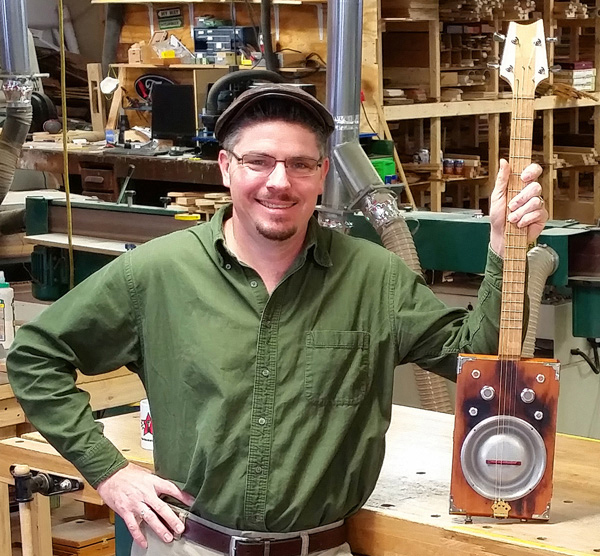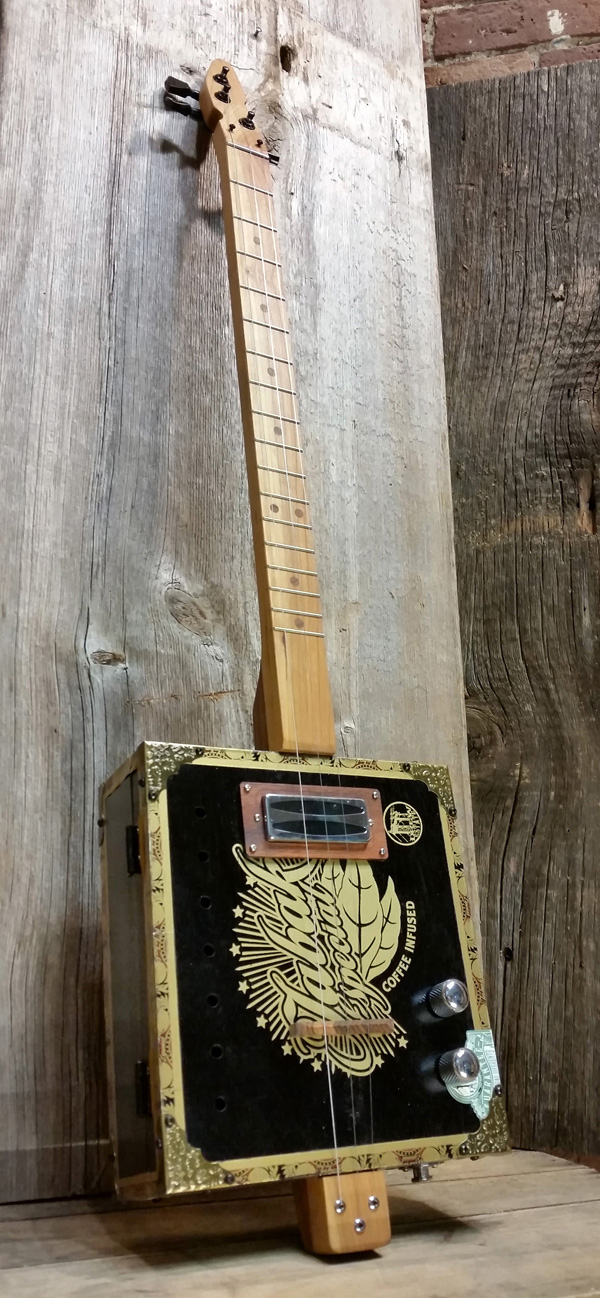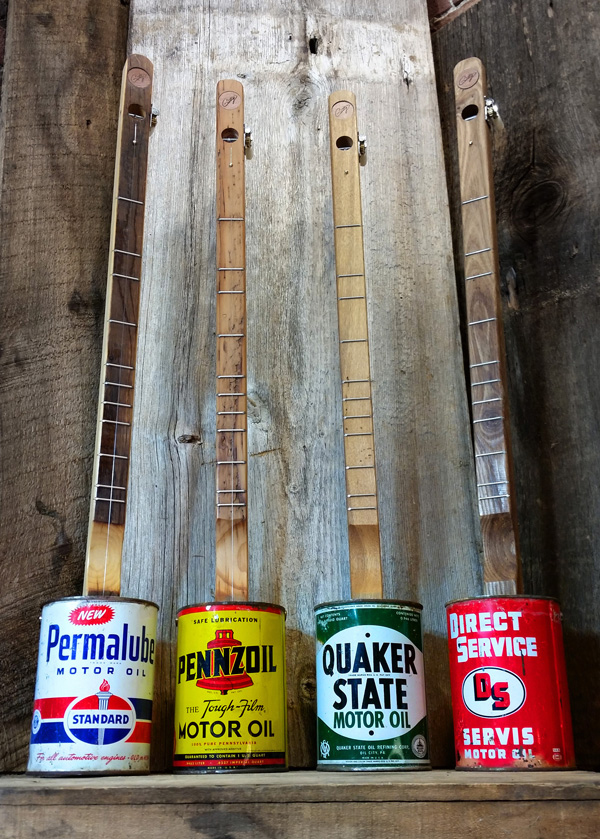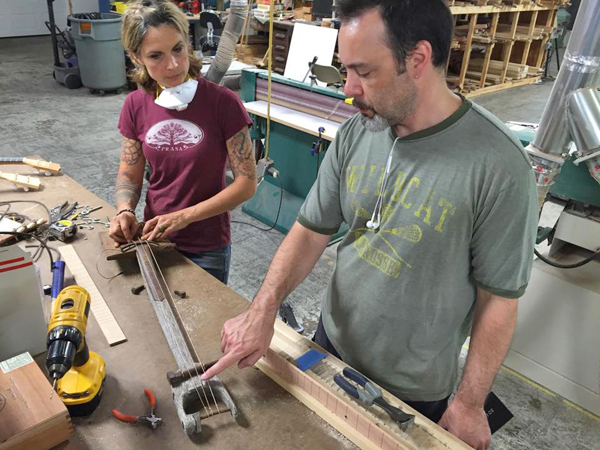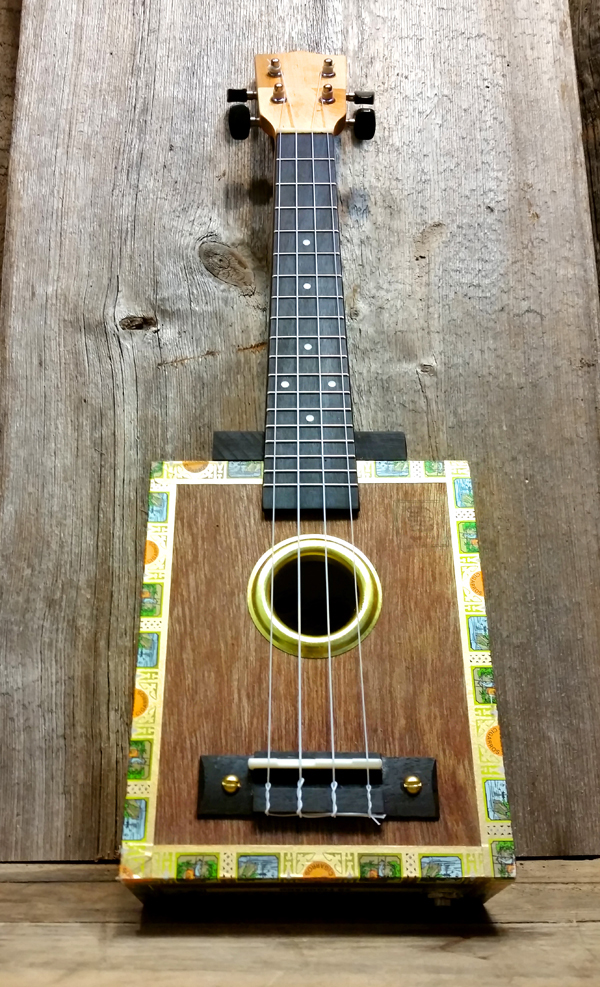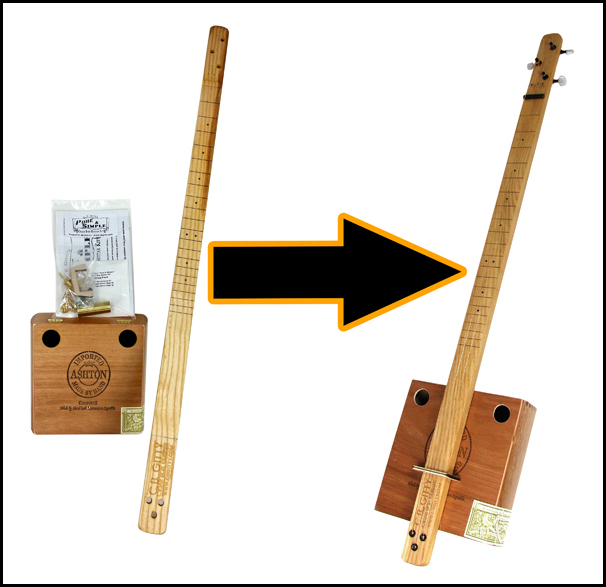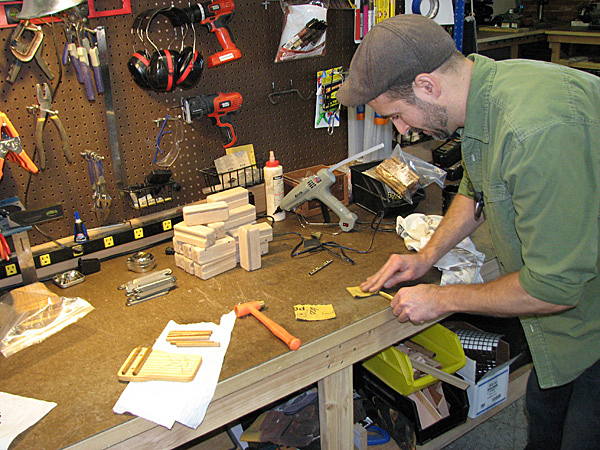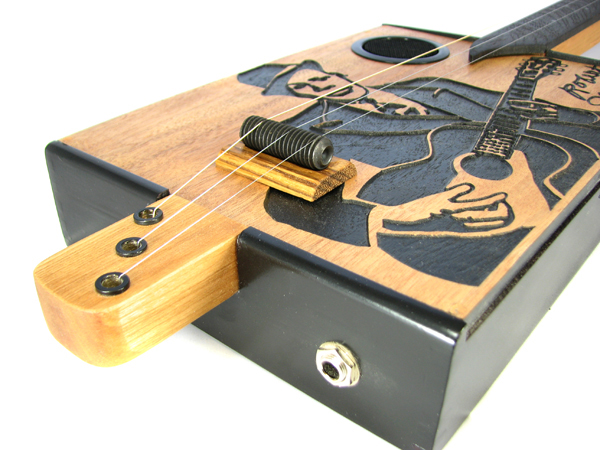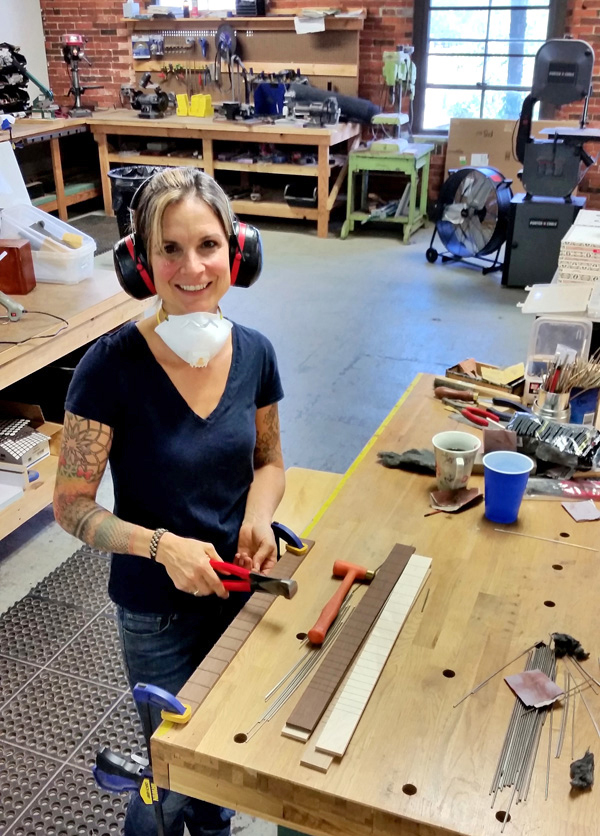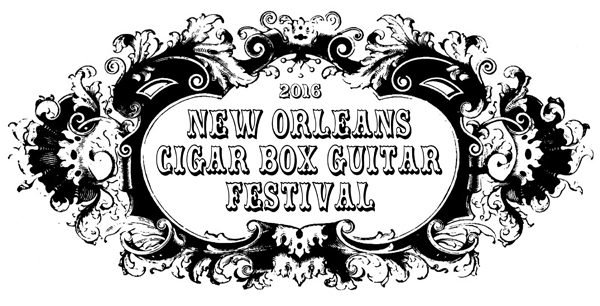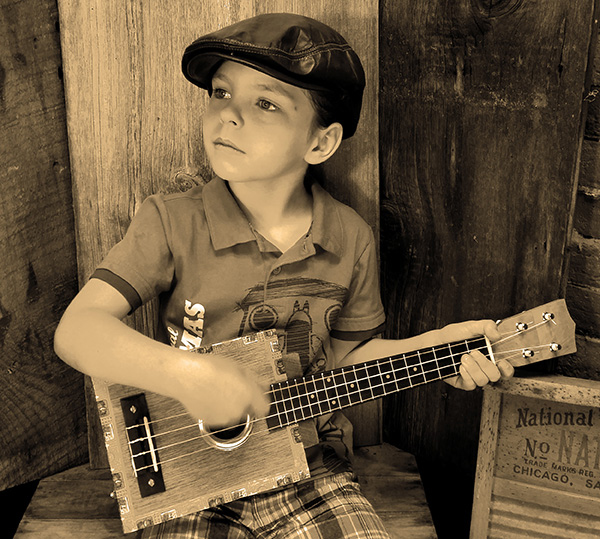
Luthiers pursue an avenue of woodworking that many of us do not: the chance to turn wood, metal and strings into music. What holds us the rest of us back from giving this sort of transformational woodworking a try? Well, for some — myself included — we may not feel particularly musically talented. Or maybe we decide that our woodworking aptitude is the roadblock: surely, we think, it must be difficult to build a guitar, ukulele or other stringed instrument that will actually play a tune in key! Could a beginner or a casual woodworker really make that happen?
For “C. B. Gitty” Ben Baker, founder of C.B. Gitty Crafter Supply, the answer to that question is, unequivocally, yes. With no luthiery experience and just a few tools, you can make an affordable instrument that plays music. The only thing holding you back is you.
C. B. Gitty stands for Cigar Box Guitar, and this simple three- to six-stringed instrument is the source of Baker’s nickname and his Rochester, New Hampshire, business. The company offers kits, pre-built guitars, cardboard and wooden cigar boxes, and a full range of parts and tools to make these instruments. Baker and his staff of seven employees also sell supplies for building other DIY-friendly instruments, including one-string diddley bows and “canjos,” plus ukuleles.
“Anybody can build his own instrument … we have a three-string cigar box guitar kit that requires only a screwdriver and about 30 minutes to put together,” Baker says.
Simplicity is part of the allure that drew Baker into cigar box guitars about eight years ago. A friend bought him a canjo — a one-string guitar with a beer, oil or other can as its resonator — after a visit to Gatlinburg, Tennessee. “I picked it up, plunked a few notes on it and said: I could build one of these,” Baker recalls.
At the time, Baker had some woodworking experience and had inherited some tools. While he couldn’t find much about canjos online, he did find a good deal about cigar box guitars. So, he downloaded some free plans and set to work on his first instrument. “More soon followed, and I was hooked.”
Baker started the business by selling fret wire on eBay to help fund his new guitar hobby. Soon, customers and others in the cigar box guitar community were asking him to add more supplies to his inventory, like tuners, decorative corners and other key items. “I would find a supplier and add them to the lineup, and (Crafter Supply) has grown organically from there,” Baker says.
The heritage of cigar box guitars also has allure for Baker. These instruments have American origins that trace back to the late 19th century, around the time that wooden cigar boxes came into fashion. It didn’t take long for enterprising musicians to figure out that a cigar box can resonate sound, just like a guitar’s sound chamber. And, a cigar box is a whole lot more affordable, even free.
Baker says the first known image of a cigar box instrument — a simple fiddle — dates to around the Civil War. Daniel Carter Beard, one of the first national commissioners of the Boy Scouts of America, published the first known plans for building a cigar box guitar/banjo in his publication, The American Boy’s Handy Book, in the late 1800s.
Poverty was a driving influence for this early music movement, Baker adds. Would-be musicians, often African American, who couldn’t afford a “real” guitar, could make one from an old cigar box, a packing crate for a neck and some broom or screen wire.
“On these primitive homemade guitars some of the biggest names in blues music got their start: Lightning Hopkins, Blind Willie Johnson, Carl Perkins, Robert Pete Williams, Hound Dog Taylor … possibly even Muddy Waters and B. B. King had a go at building their own cigar box guitars,” he speculates.
But, Baker clarifies that, while cigar box musicians tend to gravitate toward the blues, any type of music can be played on a cigar box instrument, “from folk to rock, punk to metal, jug band jazz to classical and even New Age. Cigar box musicians are always pushing the boundaries of what these amazing instruments can do,” Baker says. “There are no rules.”
That musical “lawlessness” and historical frugality carries over nicely into the DIY nature of these guitars. Baker sells kits that start at $24.99 and require some cutting, drilling and gluing, up to $79.99 for his “Pure and Simple” guitar. It takes only a Phillips screwdriver to assemble, because all the “tricky bits” have been done by Gitty and his staff already.
Even the more involved kits require only a modest collection of tools to build: a hand saw, drill, screwdriver and some wood glue are about all it takes.
“You can make them as simple or complex as you want,” Baker says. “Leave the wood bare or spend days doing a fine hand-rubbed finish. Spend weeks on delicate abalone inlay, or draw frets on with a marker. Buy the finest guitar hardware, or repurpose old eyebolts. Use all hand tools or the latest CNC technology. It’s up to you; the only rules are those you choose to follow. If something doesn’t work, salvage the parts and try again.”
And that freedom inspires an amazing range of styles and builds, Baker says. There are acoustic, electric, and acoustic/electric models. People build the standard one- and three-string varieties up to as many as 6-string electrics. Baker has seen “crazy” guitar/harp combinations with many strings, various sizes of ukes and U-basses too. If you can dream it, there are no imposed limits.
To supply musicians with what they need, C.B. Gitty Crafter Supply both imports and manufactures hardware and parts for its catalog. Baker and his staff build ready-to-play cigar box guitars, ukuleles and canjos, as well as small amplifiers. The 13,000-square-ft. workshop and CNC laser engraver also turn out necks, fretboards and other wooden parts, plus tools and templates of their own designs that aren’t available anywhere else.
Baker says that producing as much of his inventory as possible in-house has always been a business goal. “I’m proud to be able to manufacture these items here in our own workshop, and to be able to pay people a solid living wage to do it.”
He also invests heavily in spreading the word about the culture of cigar box guitars and other homemade instruments, which he considers to be a musical grassroots movement. The company supports websites such as CigarBoxNation.com and CigarBoxGuitar.com, Facebook campaigns, creating and sharing free building plans and how-to-play instructional videos, plus archiving and sharing historic plans, photos and other information. C.B. Gitty Crafter Supply sponsors cigar box guitar events and festivals, supports musicians who use these instruments in their acts and provides deep discounts to teachers and schools. Baker feels his company is at the very center of this movement.
“I believe passionately in the core idea that anyone can build their own instruments and make their own music. The idea that music comes up from the roots and is not handed down from some ivory tower. These instruments, built by people all over the world with very little or no experience with the traditional forms of luthiery … I think they are changing the world,” Baker says.
And true to its mission, C. B. Gitty will be one of the major sponsors of the upcoming Cigar Box Guitar Festival, which is being held January 15th and 16th in New Orleans. Baker says that unlike many other festivals, which are smaller-scale and more loosely organized in parking lots, bars and parks, the New Orleans festival is being held in a fixed-capacity theater environment, with ticketed admission and with professional sound and support services. The quality of the event should rival the annual Huntsville Cigar Box Guitar Festival, which has been held for the past 11 years at the Lowe Mill Arts Center in Huntsville, Alabama, and is the best-produced and longest-running festival of its kind.
“I believe this festival will open a lot of peoples’ eyes in the more traditional avenues of the music business, to what cigar box guitars can do and can be … I’m very excited to be a part of it, and to see where it will go.”
Baker feels that the cigar box guitar harmonizes well with today’s broader “maker” and DIY culture, but it stands apart from it, too – and even from other woodworking pursuits. The end result, be it a guitar, canjo or high-end ukulele, isn’t an end in itself. It’s the beginning of something even larger — music — for those willing to pick up a screwdriver or tighten a string. And there’s room for all of us to build something and start playing … whether we’re children, aspiring older musicians or woodworkers who doubt we can make an instrument that actually can play a tune.
“When you build a cigar box guitar … you are creating a piece of art (the instrument) that can in turn be used to create more art (music). That is a very powerful concept. These are not simply utilitarian pieces, like say a wooden magazine rack, napkin holder or other woodworking project. These are pieces of art that can and are used to make art. For me, that is something special.”
Learn more about C. B. Gitty Crafter Supply by clicking here.
